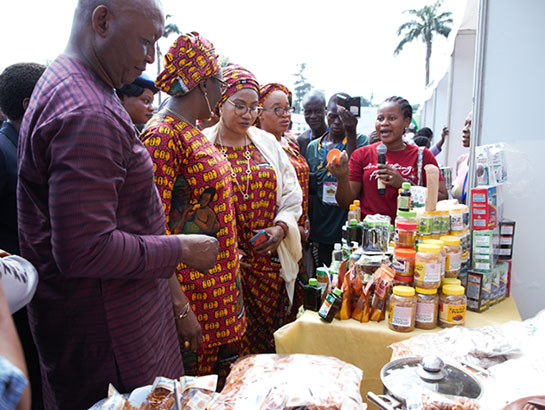The fifth annual HarvestPlus Nutritious Food Fair in Nigeria, which took place in the southwestern city of Ibadan from Nov. 13-15, gathered stakeholders from multiple sectors to assess the progress of biofortification in the country and chart paths scaling up this nutrition solution.
Representatives from both small and large companies were present in force, and they showed how they get biofortified foods to consumers through creative, convenient, and affordable products. Not only do these products deliver nutrition, but they also are profitable and growing lines of business.
GraceCo Industries Ltd. is one of the larger private-sector partners of HarvestPlus Nigeria. Tunji Kalajaiye, the company’s director of business development and strategy, explained that they “decided that nutrition was important to us. We have nutritious crops—vitamin A corn and cassava—in our product line, and we see growth potential in this area.” GraceCo makes a porridge (or pap) mix made from vitamin A maize, and the cassava-based Tasty Bites snack.
Kalajaiye said biofortified foods also aligned with the company’s latest rebranding that focused on the mission “food simple, nutritious, and affordable.” Apart from the nutrition provided by biofortified ingredients, he said they also support affordability. “Affordability would have been impossible if we had to fortify after the fact, it would be too expensive. Biofortification made it easy because we use the same raw materials—cassava flour or corn—to achieve our goals.” He added that the collaboration with HarvestPlus allowed GraceCo to leverage existing research and development on crops that would have been burdensome to conduct separately.
Pelumi Aribisala is the co-founder of Cato Foods, which specializes in nutritious staple food-based products. He first heard about biofortified products in 2012 and subsequently visited the HarvestPlus office, where he concluded that “This is actually what Cato Foods is trying to do. We decided to take the bull by the horns and take biofortification to the people.”
Cato Foods’ signature product is Casstard, a custard made from vitamin A cassava. “It is designed to reach children, especially in rural communities—people who live below 1 USD per day and could not afford nutritious foods,” he said, noting that they also sell nutritious Gari Plus and Fufu Plus. “We believe in food security, and it’s important that we have food products that are nutritious for every member of the household,” said Aribisala, who is also a member of the Ashoka Changemakers global network of social entrepreneurs and innovators.
Harvest helped Cato Foods develop the Casstard product and continues to provide technical, regulatory, and marketing support, which Aribisala described as integral to scaling up Casstard production. He said Casstard output is poised to double soon to 10 tons per day. “Biofortification goes beyond just an idea, it’s really a movement that is solving problems. It’s a sustainable way of addressing malnutrition in Africa,” he said.
August Secrets is a Nigerian company selling baby and toddler foods that was founded by Oluwatoyin Onigbanjo, a young woman entrepreneur. She said she was inspired to start the company by her own search for healthy foods for her son after he began to reject available store-bought options. August Secrets’ product line includes some items made with biofortified ingredients, including Nuttymeal, a cereal mix that includes vitamin A maize, and Mixagrain, another cereal mix that includes vitamin A orange sweet potato. August Secrets has been successful with a community-driven, social media-strong approach to raising awareness and driving online purchases. Onigbanjo said August Secret products have reached nearly 1 million children and the company is scaling up production of biofortified items, primarily in the form of cereal mixes that are priced to be accessible to everyday Nigerians.
Consumer education is a big part of their marketing strategy. “We have a very large community of mothers that we teach them how to plan their meals. They learn that the biofortified foods taste amazing but that they are also good for their bodies.”
That said, she says there is still a lot of work needed to raise awareness about the need for nutritious foods. “What we try to do is to shine a light on mothers making good food choices. We are seeing a lot of traction right now, and we will continue our efforts,” said Onigbanjo.
Napetsa Farms and Food Processing displayed their vitamin A cassava-based products at a booth in the Fair’s exhibition area. Outside the stand, CEO Adewale Fosudo explained that they currently are producing cassava on 50 hectares but they will soon expand to 200 hectares. “Biofortified agricultural products are surely the future because of its health benefits for everyone. But one of the things we need to do [to scale up] is to create more community sensitization programs” that can reach all segments of society, including rural and remote communities with low education levels. This includes providing information in their own languages.
Fosudo urged HarvestPlus and its partners to do more to “spread the message and let people know what HarvestPlus and the international community are doing to make sure that they are not just fed but nourished with vitamins and all of these micronutrients. This will help push demand.”
